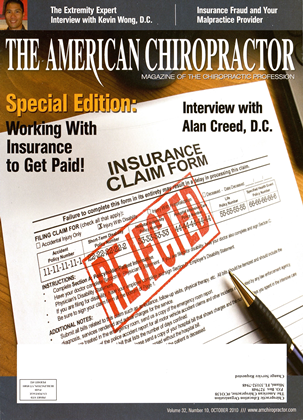Aucjus i 31,2010 ■ Tin-: United Siati:s is experiencing a shortage of primary care FAMILY DOCTORS. TllAl's WHY OVFR THE LAST 8-10 YF.ARS, CHIROPRACTIC ASSOCIATIONS IN STATES WITH SEVERE SHORTAGES OF PRIMARY CARE PHYSICIANS HAVE SOUGHT TO EXPAND THE SCOPE OF PRACTICE FOR CHIROPRACTIC PHYSICIANS. THEY SEEK NEW LAWS AND REGULATIONS I HAT WOULD ALLOW CHIROPRACTIC PHYSICIANS TO PRESCRIHE A LIMITED RANGE OF MEDICATIONS IN ORDER TO HELP THEIR PATIENTS IN A MORE COMPREHENSIVE MANNER. THESE INCLUDE MEDICATIONS THAT ARE COMMON TO CONDITIONS FREQUENTLY SEEN ISY CHIROPRACTIC PHYSICIANS, SUCH AS ANTI-INFLAMMATORY DRUGS AND DRUGS THAT TREAT AILMENTS SUCH AS OSTEOPOROSIS AND ARTHRITIS. To (his end, several individual state chiropractic associations contacted experts at National University of Health Sciences (NLJHS) in Lombard, Illinois and asked them to assess what additional training would be required to prepare chiropractic physicians to have a license to prescribe from a limited formulary of drugs. Top NUHS faculty in pharmacology and chiropractic medicine examined and compared curricula from allopathic medical schools in addition to a wide range of medical specialty schools, such as: osteopathic medical schools, schools of podiatry, dentistry, psychology and those training nurse practitioners. Each of these professions has also recently been granted authority to prescribe medications from a limited formulary. NUHS determined that chiropractic physicians would need 90 hours of pharmacology in addition to the prerequisite physiology and biochemistry courses already required by accredited chiropractic education programs. At the same time that it was compiling its review, NUHS also launched an accredited masters of science degree program in advanced clinical practice, which will include 90 hours of advanced pharmacology coursework as part of its degree requirements as well. One state. New Mexico, has already passed new regulations allowing chiropractic physicians with the right licensure and training to prescribe drugs from a limited formulary. The New Mexico Chiropractic Association asked NUHS if it would be willing to offer post-graduate coursework in Albuquerque delivering a 90-hour program in pharmacology to chiropractic physicians wanting to practice under the new expanded scope of care. Teaching the New Mexico program is Dr. Daniel Richardson, Assistant Dean at NUHS, who holds a Ph. D. in Pharmacology and Pharmocognosy from Loyola University, Stritch School of Medicine. More states are thinking about expanding the scope of practice for chiropractic physicians. In fact, several physicians attending the New Mexico program come from other states, in hope that they will be prepared for the future. Because of this growing interest, NUHS is also thinking about offering its MSACP in New Mexico as well , and is strategizing how to deliver similar programs in other states in the future. more news on page 60
 View Full Issue
View Full Issue






